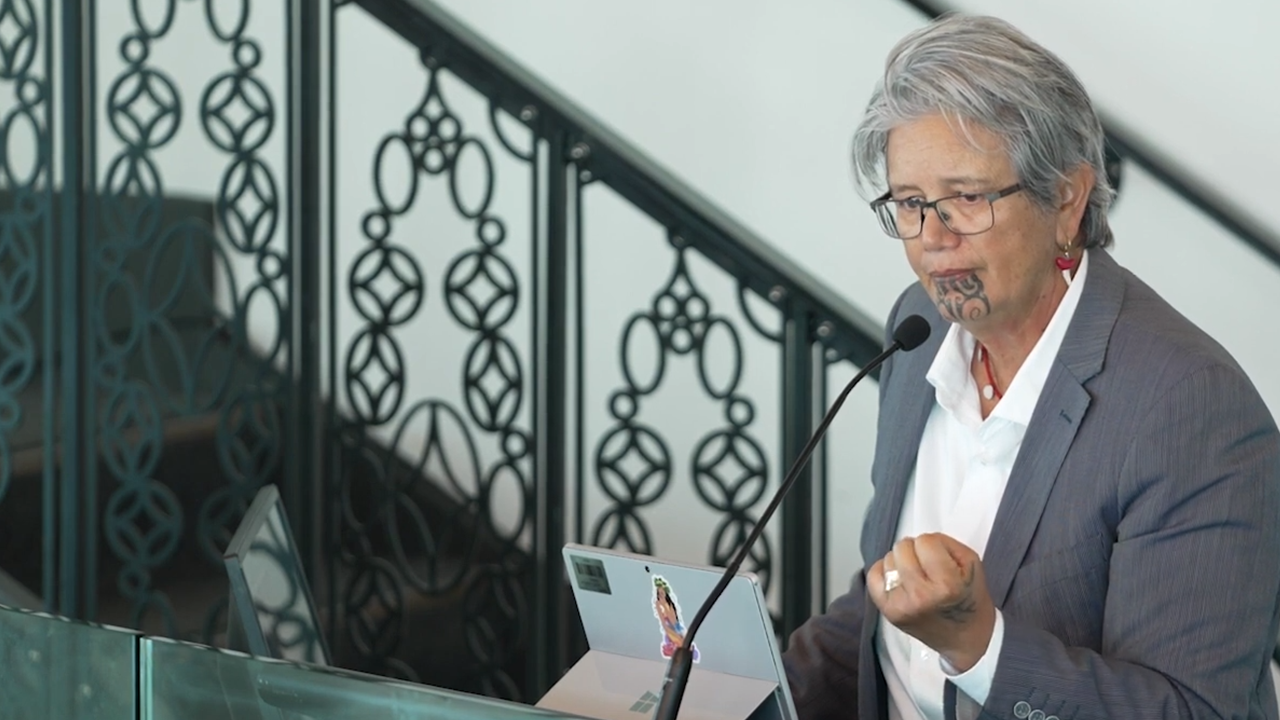TE RĀ TUATAHI DAY ONE
Pātikitiki is a forum for kaimahi Māori to whakawhanaunga, celebrate & share Māori Frameworks utilised in practice. The kaupapa recognises the unique contribution kaimahi Māori make to uplift and protect mauri in the journey of whānau wellbeing. The tohu and name of the symposium are symbolic of the pātiki and represents favourable conditions, abundance. As kaimahi Māori, this is the environment we aim to create with our frameworks to inspire whānau to achieve their aspirations.
Sharon Aroha Hawke
Ngāti Whātua, Ngāti Mahuta
Ko te pātiki he kai, he ika, he tohu!
In the realm of Māori aspiration both past present and future as workers within our community in health and well-being, we rely on the kaitiakitanga of Papatūānuku. Her abundance. Her generosity. Her protection. Her participation. Her compassion and her foresight for all of us.
Once upon a time, we walked with her, upon her with respect, with connection and with an umbilical cord of understanding and mutual love. Can we utter this same phrase today? Is it at all possible that we have lost that connection with the loss of land, the loss of tikanga and the loss of our poetic reo Rangatira? This question is rhetorical but worthy of repetition in a forum that focusses upon the well-being of our Māori workforce in this sector.
Wiremu NiaNia
Ngāti Kahungunu, Ngāti Tūwharetoa, Ngāi Tūhoe
Wairua Led Hauora
From as early as three years old, Wiremu was identified by Te Awhimate as having a fine spiritual awareness and she guided him very closely in mahi wairua practice and helping him interpret his experiences.
Even from his teenage years, he was frequently called on to assist people with mahi wairua. His kuia was considered a tohunga and Wiremu was apprenticed to her in her healing work, and continued to learn from her until her death when he was in his early 30’s.
During his life Wiremu has worked as a shearer, a fencer, a scrubcutter, a musician, a songwriter, a Maori activist and a youth worker. As a teenager he had close gang affiliations and had a period of time in prison. His youth work led to his enduring passion for assisting youth at risk.
Dr Te Rita Papesch
Waikato-Maniapoto, Ngāti Porou, Ngāti Whakaue
He Rākau Taumatua – (Ngaia, TW. 2018)
A Māori Model of Leadership Practice
He Waka Hiringa (HWH) is a Masters of Applied Indigenous Knowledge offered as a programme of two years’ study by Te Wānanga o Aotearoa. The main pre-requisite for enrolment in to this graduate degree is for the student to be a master of their own practice, whatever that practice may be. In other words, they are already leaders in their own field of practice. My task is to help them clarify how they indigenise their practice; introduce them to academic processes to achieve this and encourage them to create their own Models of Practice (MsOP) to guide them as they work with students or clients.
Tuari Pōtiki
Kāi Tahu, Kāti Māmoe, Waitahā
A Treaty-based approach to rangatiratanga and authority
From 1994 – 1997 Tuari managed the Taha Māori programme at Queen Mary Hospital, Hanmer Springs before moving to the Community AOD Service in Christchurch where he helped establish a Whānau Clinic for Māori clients and a Māori Methadone programme.
Tuari also has extensive governance experience and was recently appointed to the Whānau Ora Independent Reference Group. He has also served terms on the boards of the Southern District Health Board, Canterbury District Health Board, the Canterbury Community Trust and Ngāi Tahu’s Health and Social Service agency He Oranga Pounamu. He was also the Senior Māori Advisor to the National Addiction Centre who sit within the University of Otago.
Tuari is currently the Director of Maori Development, Otago University. Before that he was based in Wellington as General Manager of Strategic Operations for the Alcohol Advisory Council of New Zealand (ALAC).
Jacqui Harema
Ngāpuhi
Tools to advance whānau, hapū, iwi social, cultural, health and economic wellbeing
Grown and nurtured in West Auckland and long-serving worker of Te Whānau o Waipareira, Jacqui (Director Whānau Ora) works along her team to develop and embed a fully integrated, multi –sector solution that is led and designed by families based on their aspirations.
She brings 20+ years’ experience in indigenous service provision, strategy and innovation, family-centred design, and implementing and embedding outcome frameworks.
Sharon Shea
Ngāti Ranginui, Ngāti Hine, Ngāti Hako, Ngāti Haua
Tools to advance whānau, hapū, iwi social, cultural, health and economic wellbeing
Sharon Shea. Principal. Shea Pita & Associates Ltd.
MNZM, MSC Comparative Social Policy (Oxon), BA/LLB (Auckland).
Sharon has been providing consulting services for nearly 20 years. Sharon is a director and principal of Shea Pita and Associates Ltd, a kaupapa Māori company that specialises in equity, diversity, outcomes and working with clients to create sustainable and effective solutions.
Panel
Value added! The Potential; personally, professionally, politically!
Tools to advance whānau, hapū, iwi social, cultural, health and economic wellbeing
Terry Huriwai (Chair) - Ngāti Whakaue, Ngāti Pikiao, Ngāti Porou
Jacqui Harema - Ngāpuhi
Aroha Noema - Ngāi Tūhoe
Ngamaru Raerino - Ngāti Awa, Ngāti Rangiwewehi, Ngāti Rangitihi, Ngāti Tūwharetoa








